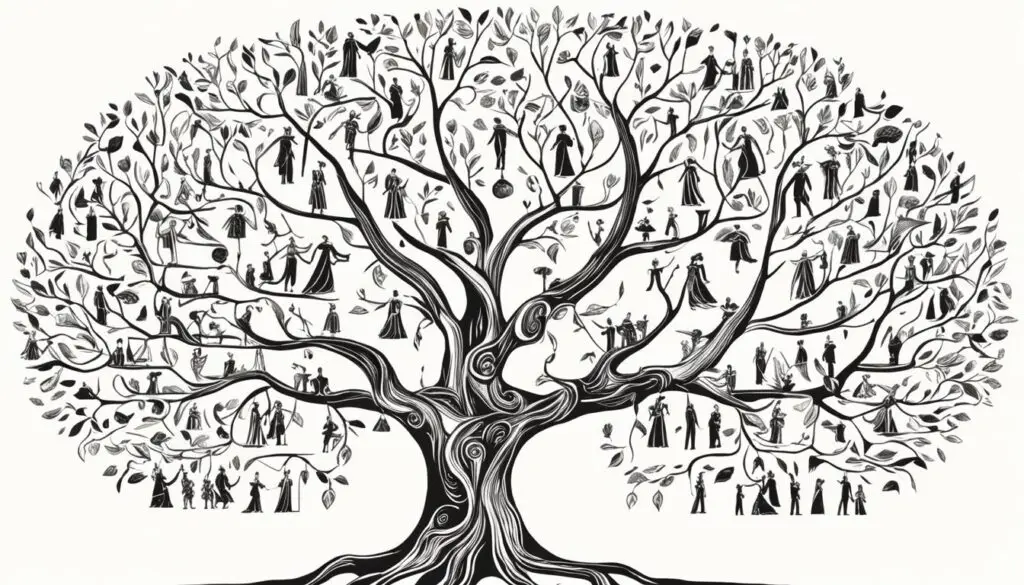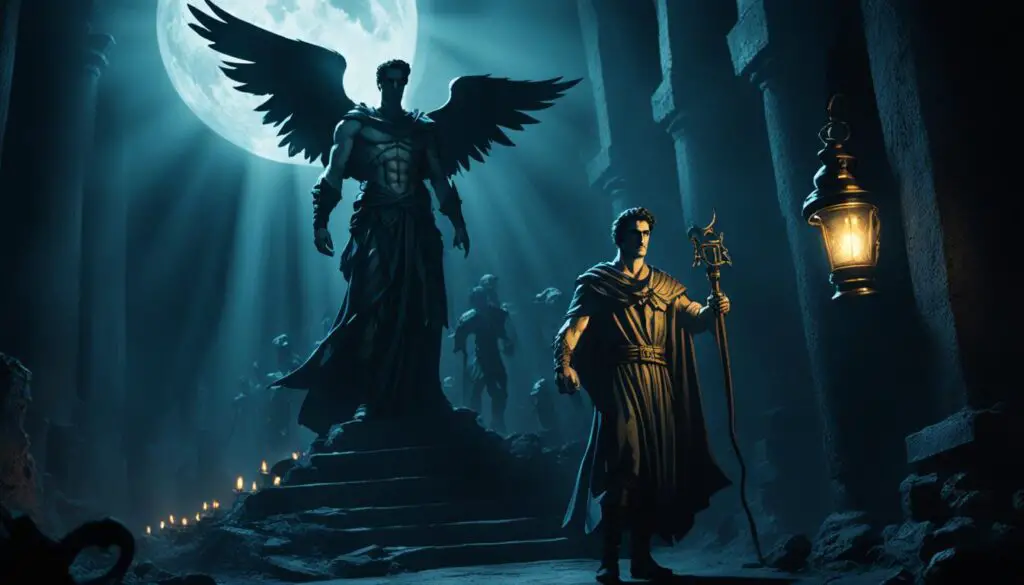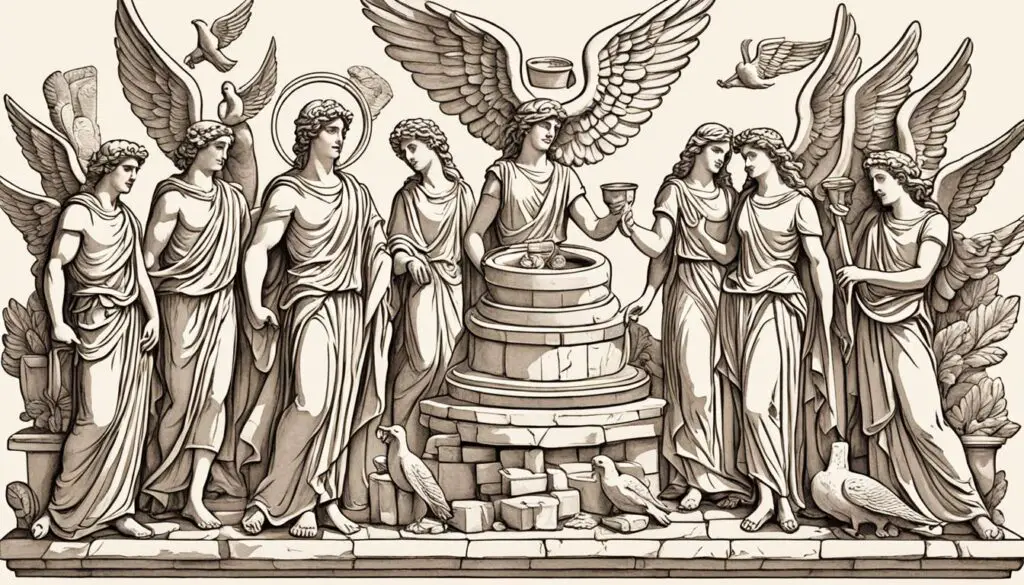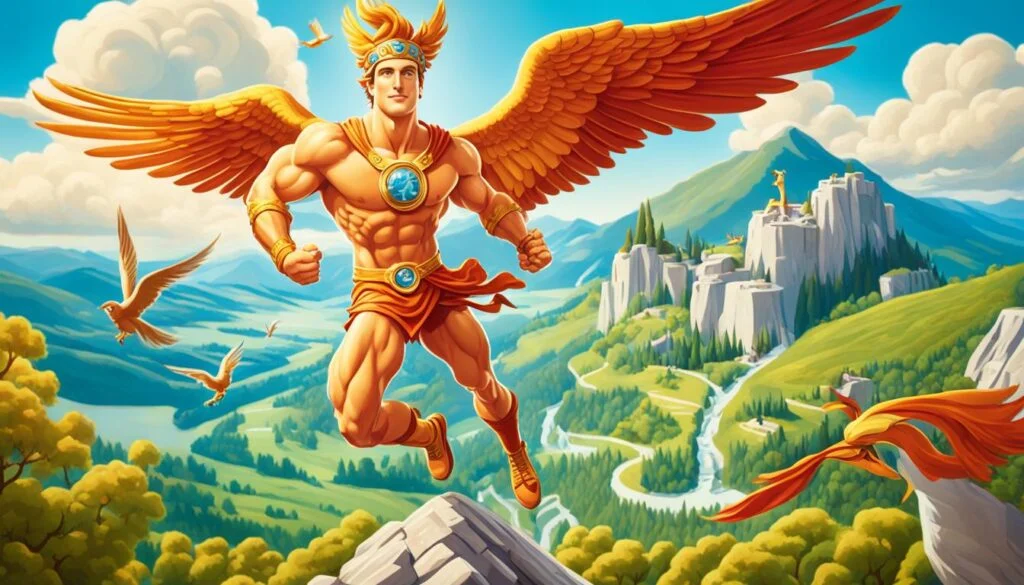In Greek myths, Hermes plays a big part as a messenger among the gods. He also helps travelers and looks after business.
Hermes is the son of Zeus and Maia. He is known for being quick, smart, and having a big role in stories.
Hermes carries a staff with snakes, called a caduceus. He also wears sandals with wings to show how fast he is. He is not just a messenger.
He once stole cows and gave his brother Apollo a musical instrument.
The Roman god Mercury is like Hermes, showing his wide reach. Hermes isn’t only about messages.
He is also about secrets, keeping safe, and new ideas.
Key Takeaways:
- Hermes is recognized as the Greek god of messengers, travelers, and commerce.
- He is one of the twelve Olympian gods and the son of Zeus and Maia.
- Hermes invented writing, the alphabet, fire, dice, and musical instruments.
- He is depicted carrying a caduceus and wearing winged sandals.
- Hermes’ Roman counterpart is Mercury, highlighting his significance in both Greek and Roman cultures.
Introduction to Hermes: The Greek God of Messengers and Travelers
The introduction of Hermes is very important in Greek stories. He is the god of many things like messengers, travelers, and making deals.
Hermes is key among the gods who lived on Mount Olympus. He is the son of Zeus and Maia, bringing his unique skills to the mix.
Hermes is easy to spot with his hat and shoes that have wings. He’s always shown as young and strong, and he doesn’t have a beard.
This fast guy can move between worlds quickly, which is a big part of his job.
Hermes isn’t just about messaging and helping travelers. He also looks after thieves, and shepherds, and helps keep secrets in his special ceremonies.
This shows how he is smart and can work with many different skills.
He grew up in Mount Cyllene, learning his skills from Maia. Many believe Hermes got his name long ago in a place called Mycenae.
He helps with all sorts of things, like talking to each other, doing business, and even leading the dead where they need to go.
In Greek stories, Hermes is also a big name in creating things and using your mind. He helped make the Greek alphabet, numbers, music, and watching the stars (astronomy).
This makes him not just about travel and messages, but also about thinking of new things.
Hermes does a lot – helping gods and humans in many ways. He even helps the dead get to where they should go, showing how he is everywhere, even in places we can’t see.
This shows how big his role is and why he is remembered so much in Greek myths.
Who was Hermes in Greek Mythology
Hermes was a tricky and quick god in Greek myths. He was part of the Twelve Olympians. Hermes guarded borders and helped travelers.
Early Origins and Family of Hermes
Hermes is one of the oldest gods. He showed up during the Mycenaean times. Zeus and a nymph named Maia are his parents.
In the myths, Hermes was a clever trickster. Sometimes, he played tricks on other gods. He is also known to be wise and daring.
Birthplace and Early Worship
Hermes is linked to Mount Cyllene in Arcadia, his birthplace. He was worshipped for helping shepherds and farmers.
This was because he cared for travelers and protected them.
His symbols, like the caduceus and winged helmet, showed his roles. They represented his work in trade, travelers, and messengers.
He was truly a god for many parts of life.
The Role of Hermes in Greek Mythology
Hermes is from Greek mythology and is part of the Twelve Olympians. He is in charge of many things like travel, roads, thieves, sports, and shepherds.
He is known as a very smart and quick young god. He wears winged sandals and a cap and carries a special staff.
This shows how he can do many different jobs, both with gods and people.
Hermes as the Messenger of the gods
In Greek myths, Hermes is special as the god who carries messages between the other gods.
Zeus likes him a lot and uses him for important tasks, like rescuing someone from the Underworld.
This skill at moving between worlds makes the Messenger god Hermes very important in many stories. He shows how to do big jobs with grace.
God of Boundaries and Travel
Hermes is also the god of boundaries and travel. He helps move between very different places and makes it easier.
He is famous for making the lyre and helping create the Greek alphabet. Hermes is key for leading people to the Underworld and helping heroes on their journeys.
His stories often show how smart and tricky he is while doing his work.
Symbolism and Attributes of Hermes
In Greek myths, Hermes is a special being with many symbols and meanings. He is the protector of messages, signs, and business.
His main signs are the caduceus and the winged sandals. These show how important he is and his big role.
Symbols Associated with Hermes
Hermes’ symbols show his many skills. His Caduceus Hermes shows he’s good at talking and making deals.
His talaria, the winged sandals, stand for speed and being a heavenly messenger.
He also has a special hat, petasos, showing his travel job. Animals like the ram and tortoise mean a lot to him too.
The hawk and the crocus flower show how much he affects everything around him.
The Caduceus and Winged Sandals
The Caduceus Hermes has snakes and wings on a stick. It’s a big symbol for Hermes. It means he likes peace and talking things over.
The winged sandals are very well-known. They let him move fast in the sky. This shows his job as a go-between for the gods and the leader of souls below.
The Hermes symbolism was very real in his stories. The caduceus and winged sandals were used by him.
They helped heroes like Perseus defeat Medusa. This shows how smart and helpful Hermes was in the myths.
Hermes in Mythological Stories
Hermes is very well-known in Greek myths. He is not just the god’s messenger. He’s known for many adventures.
A famous tale is about him stealing Apollo’s cows and his fight with Argos. These stories show how clever and important Hermes was to the gods.
The Story of Hermes Stealing Apollo’s Cattle
One key story is when Hermes steals Apollo’s cows. It happened soon after Hermes was born.
He made shoes for the cows so no one could follow them. When Apollo found out, Hermes used music to win him over.
This made Hermes known as a trickster and smart god.
Hermes and the Many-Eyed Argos
Hermes also faced the giant Argos. Argos watched over Zeus’ changed lover, a cow named Io. Zeus sent Hermes to save Io by defeating Argos.
Hermes made Argos sleep with his music and then he killed him. This showed Hermes’ bravery and his commitment to Zeus’ tasks.
The Family Tree of Hermes

Hermes is a key figure in Greek myths, with a big and complex family. He comes from both divine parents, Zeus and Maia.
Many deities and gods are part of his family tree, making Greek myths more interesting.
Parents and Siblings of Hermes
Hermes’ story starts with his parents, Zeus and Maia. Maia, a Pleiades nymph, had Hermes in a hidden cave.
Being born from Zeus, Hermes has lots of half-siblings. These include famous gods and goddesses like Aphrodite and Artemis.
Hermes has about 90 to 100 siblings. This makes his family meetings lively on Mount Olympus.
Children of Hermes
Hermes has many children. Some are gods, like Pan and Hermaphroditos. Others, less known, include Angelia and Palaestra.
Unique to Hermes are the nymphs, Satyrs, and Oreads, showing his wide connections.
He also had kids with humans, who were known for their wits and bravery. Aithalides and Autolycus are among them.
These children were scattered around, but many lived in places like Attika. His kids held important roles in society, like kings and poets.
In Attica, Kephalos, Keryx, and Eleusis are remembered well.
Hermes’ relations show his deep impact on Greek mythology. They highlight his roles as a god and as a father.
The story of his family underlines his complex and lasting influence.
Hermes as Mercury in Roman Mythology
The mix of Greek and Roman ways comes to life with Hermes, who Romans call Mercury.
These gods are much the same yet have stories and worship that are both different and alike.
Differences and Similarities
Hermes and Mercury were both Messengers of the Gods and looked after trade. They also kept travelers and thieves safe.
But, their jobs had some differences. Mercury was a key god among the Romans, known for his role in the 12 Dii Consentes.
Greeks saw Hermes as the god of clever talk and peace.
One clear difference is Mercury’s big deal in business and making money, which was key to Romans. His name comes from ‘merx,’ showing how important he was to merchants.
On the other hand, Hermes did a lot more, like guiding souls to the underworld.
Roman Myths Involving Mercury
As Rome grew, Mercury became popular. They even mixed him with local gods like the Celtic Lugus and the German Wotan.
They saw him as the one who started all the arts and gave him honor all over the place. The ancient ruins in Pompeii show how much they liked him.
There was a special temple for Mercury in Rome on the Circus Maximus, built in 495 BC.
Every year on May 15th, they had a big party to celebrate him. This shows how Romans changed Hermes into Mercury.
They focused on his power to bring luck and wealth.
Even with their differences, Hermes and Mercury showed the Greeks and Romans love for using their wits and skills.
Things like the caduceus, winged shoes, and helmets show they could move fast between gods and people.
The Trickster God: Hermes’ Mischievous Exploits
Hermes is a key figure among the Olympian gods. He’s known for being a trickster.
With his clever deceptions and tricks, Hermes breaks the rules with his Mischievous ways. He plays pranks on gods and humans.
He is very clever and fun.
For example, he once stole Apollo’s cattle. He used many tricks to do it without being caught.
He also tricked the giant Argos and then defeated him. These stories show how smart and tricky Hermes can be.
Besides his tricks, Hermes is a great inventor. He made the first lyre out of a tortoise shell.
This shows his creativity and cleverness. He gave the lyre to Apollo as a gift.
His trickster and inventor sides make Hermes special. He is known for his many skills and abilities in Greek mythology.
Hermes as a Psychopomp: Guide to the Underworld

In Greek mythology, Hermes is a vital figure. He’s not just a messenger. He’s also the god who guides souls to the underworld.
His work is crucial in understanding our minds and the afterlife.
Role in Greek Funerary Rites
Hermes plays a big part in Greek funerals. He guides souls to the afterlife. Hermes ensures they find the River Styx, marking the underworld’s border.
Not crossing the river means big trouble in their beliefs. He truly helps in the journey from life to death.
Hermes and the River Styx
Hermes notably guides souls across the River Styx. This river leads to Hades’ realm. He calls on Charon to take souls across.
His role in funerals is key. Hermes doesn’t just help with the journey. He also prepares souls to face their struggles.
In contrast to the feared Hades, Hermes provides comfort and guidance. This shows his positive nature in myth and psychology.
He’s crucial in transitions between life and death. Hermes stands out as a caring guide in these moments.
Hermes in Art and Iconography
Hermes has changed a lot in how he’s shown over time. The Romans called him Mercury.
He was known as the Killer of Argus and Guide of Souls. Hermes was often shown with the caduceus, winged sandals, and petasos in art.
Archaic and Classical Depictions
Back in Ancient and Classical times, art showed Hermes as a messenger and protector of travelers and traders.
He carried a staff and wore winged sandals and a hat. Hermes was also shown with the lyre, which he invented.
Stories told how Hermes guided dead souls and played tricks.
Hermes in Renaissance and Modern Art
In the Renaissance, art about Hermes became popular again. Artists showed him as full of energy, young, and fit.
He was involved in all kinds of things, like helping other gods. This trend continues today in new and old ways of showing art, mixing old myths with new styles.
Cults and Worship of Hermes

In ancient Greece, the Hermes cults played a big role. They were important in places like Athens, Delos, and Crete.
Mount Kyllene in Arkadia was a top shrine for worshipping Hermes. It was seen as very spiritual and close to the god.
In the Peloponnese region, people had different ways to worship Hermes. Athenians started making ithyphallic images of him.
This became popular in other parts of Greece too. They also used Hermae, which were stones with the head and phallus of Hermes on them, as markers.
These stones were linked to fertility and luck, showing how important Hermes was in everyday life.
The Hermaia festival was very important, especially in Athens. It included games like knuckle-bones for youths and boys.
In Athens, there were many shrines for Hermes. They were in key places like the gymnasium, marketplace, and the temple of Athena Polias.
This showed how he was connected to luck, sports, and business.
Hermes was also key in the Eleusinian Mysteries. He helped Persephone move between earth and the underworld.
This role showed his link to life, death, and new beginnings. It made his worship deep and meaningful.
In Greek culture, Hermes’ myths and symbols were very important. They were linked to things like art, literature, trade, and travel.
This made his influence go beyond religious activities. It shaped Greek thinking and society too.
The worship of Hermes mixed rituals, symbols, and community actions. This showed his many important roles and how he stayed a key figure in ancient Greek life.
Hermes’ Influence on Language and Communication
Hermes was known as the divine messenger and mediator. He played a big part in language and communication.
He helped send messages between gods and people. And he showed how to understand these messages.
Because of this, people think of Hermes as a guide for talkers and writers.
Patron of Orators and Rhetoricians
In the old days, Hermes was linked to speaking well and being convincing. They called him the Hermes Logios. He looked after people who were good with words.
This help was for anyone who needed to talk, like in business, on trips, or in court. The word for someone who translates,
Hermêneus shows how important Hermes was. He made it easier for people to talk and understand each other.
The Origin of the Term “Hermeneutics”
The word hermeneutics comes from Hermes. It’s about the science of explaining things.
The Greek word Hermêneuo means many things. It can mean translating languages, texts, or even ideas.
This shows how much Hermes was part of ancient Greek ways of explaining things.
At the Translation2000 Conference, held by NYU, experts said Hermes’ work is still important today.
He affects how we explain and understand things in the modern world.
Hellenistic and Roman Period Worship Practices
During the Hellenistic and Roman times, people worshiped Hermes a lot. They had many places and events just for him.
This showed how much they put his stories into their daily and spiritual lives.
Cult Centers in Greece and Rome
Cult centers for Hermes were found all over Greece and Rome. People could visit his temples to honor him and ask for his help.
Greece had important places like Arcadia, Athens, and Corinth. For the Roman Empire, Hermes became Mercury.
This change showed how his worship spread across many lands, blending different beliefs.
In these cult centers, followers took part in special activities. These showed they saw Hermes as a god of messages and protector of travels and rules.
Festivals and Ceremonies for Hermes
There were big festivals for Hermes throughout the year. They celebrated his different powers and duties.
The Hermaea was one of these. It had sports and games to show his link to athletics and strength.
Then, there was the Anthesteria. It happened in spring and was about spirits coming back to life. This explained his work as a guide for souls.
For these festivals, people brought gifts and wore special clothes. They also prayed as a group. These events made sure everyone remembered Hermes’ many jobs.
It reminded them he was key in business, speaking well, and journeys. This was true in both the Hellenistic and Roman times.
Hermes’ Legacy in Modern Culture

Hermes was the Greek god of messengers and travelers. His influence is big in modern culture.
You can see him in books, art, and stuff like maps and space studies. Hermes was shown as a god with many talents who linked different worlds.
Today, he is still a big part of our work and school studies.
Representation in Literature and Art
Artists, from ancient times to the Renaissance, loved to show Hermes. They painted his many roles like messenger, business god, and speech expert.
In stories, you often find his traits, like cleverness and going between worlds. This has kept Hermes popular in stories and artworks over many years.
He influences everything from old poems to new fantasy books.
Influence on Modern Cartography and Astronomy
In maps, we honor Hermes’ work by name with his Roman form, Mercury. They both are linked to finding paths and marking maps.
His connection to the Pleiades with Atlas makes him a key figure in the stars. This helps us in space studies.
Hermes is very important in Greek myths. His impact is still strong in our world today. He links old stories with what we learn now.
This keeps his spirit alive over the years.
Conclusion
Hermes plays many important roles in Greek myths. He’s seen as a god of communication, trade, and transitions.
People also think of him as a shepherd god and the quick messenger of gods. Hermes is known from old times to today, shaping lots of Western ideas and stories.
He has a special staff called the caduceus. This staff, along with his winged hat and shoes, shows he helps to bring peace and guide people.
Hermes worked with gods like Zeus and Aphrodite. He was always smart and fast in the stories about him. Learn more about Hermes’ importance in to see why he is still interesting.
The Romans also celebrated Hermes through Mercury. Mercury had similar jobs, like helping in trades and travels.
Hermes is known for being between the gods and people. Stories like that of Prometheus show his help in different ways.
Hermes is remembered from the past to today, showing his lasting impact.
Hermes brings together people and gods in a very special way. He shows how much the ancient world respected things like trade and communication.
Hermes’ stories still fascinate us today. We can always learn more about Hermes’ many roles and why he is such an important god.
FAQ
Who was Hermes in Greek mythology?
Hermes was an Olympian deity known for being several things. He led the way for travelers and guarded merchants and athletes. He also kept an eye on business and carried messages. He was Zeus and Maia’s son. He had many half-siblings and important kids, like Pan and Hermaphroditus.
What role did Hermes play in Greek mythology?
Hermes was the gods’ messenger and looked after many people. He guided souls to the afterlife. People knew him for being smart and moving fast. He could travel between gods and people quickly. This was shown by his sandals with wings.
What symbols are associated with Hermes?
Hermes was known by his symbols. These included a caduceus (staff), talaria (winged sandals), and a petasos (winged helmet). He also had a rooster, tortoise, and lyre. Each symbol showed something special about him.
Can you share a mythological story involving Hermes?
One story about Hermes is when he took Apollo’s cattle. This showed how clever he was. He also killed a monster named Argos secretly. Both these stories show what Hermes was good at.
Who are the family members of Hermes?
Hermes’s dad is Zeus and his mom is the nymph Maia. He has many brothers and sisters who are also gods and goddesses. He has kids like Evander and Pan, who is a nature god.
How is Hermes depicted in Roman mythology?
In Roman mythology, Hermes is like Mercury. They both looked after things like trade and making money. Mercury comes from the Latin word ‘merx,’ showing he is key to business and trade.
What are some famous tricks and inventions attributed to Hermes?
Hermes is famous for being tricky in stories. He created the lyre from a tortoise’s shell. He also tricked other gods and even stole Apollo’s cattle.
What is Hermes’s role as a psychopomp?
Hermes leads souls after they die, to the River Styx and the underworld. His job in funerals shows how he helps people move from life to death.
How has Hermes been depicted in art throughout history?
How people showed Hermes in art has changed. Early on, like in Archaic times, he was seen as a grown traveler. He had his staff and winged sandals. During the Renaissance, people showed all the different things he could do. This kept going into modern times.
What were the cults and worship practices dedicated to Hermes?
In ancient Greece, people really honored Hermes. They had special places for worship in cities like Athens, Delos, and Crete. At festivals like Hermaia, they showed Hermes is about luck, nature, and changing times.
What influence did Hermes have on language and communication?
Hermes made a big impact on how we talk and share messages. He helped people who gave speeches and wrote important messages. The word “hermeneutics” stands for how well we can understand what’s being said.
How was Hermes worshiped during the Hellenistic and Roman periods?
In the Hellenistic and Roman times, people still cared a lot about Hermes. They built temples for him. They still did things to honor him, like the Herakleia festival. This shows how much he still meant to people then.
What is Hermes’s legacy in modern culture?
Hermes left a big mark on our culture. He shows up in stories, art, and even in science, like maps and space study. His story and signs still inspire new work. The planet Mercury is named after him.




